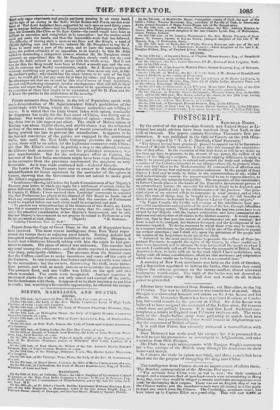In the following extract of a letter from a gentleman
who is with the army in Sinde, a different view is taken of the expedition into All- ghanistan from that which we entertain. The writer applauds Lord Auckland's policy, but blames his Generals for defective execution: we have been apt to question the policy, but gave Sir John Keane credit for masterly operations in the field.
44 Lord Auckland's wise measures have been nullified by the'selfwilledness
of Sir John Keane, the selfishness anal vanity of Sir Henry Pane, and tha mouretise lonae, amounting to imbecility, of Mr. Mc Naughten.
however, played the game ; and the only drawback is the fiyarful Fexorptell:(11'1'11;''.. For this Lord Auckland will be eventually blamed ; and Sir 11. Pane and Sir J. Keane, who are the real causes of it, will figure as little Wellingtons in a stnall way, and be called heroes—and ,fiddledees! and get ribbons null pea- sions ! Lord Auckland has played a most intricately difficult part with the worst instruments; nothing has carried him safely through but the goodness of the first calculation and the soundness of the foundation he started from: flu!), have hitherto truckled to Persia to such an extent that both Persia mad Russia have believed we really feared what Persia could do or could assist nt the performing. The league betwixt Dost Mahomed of Calm'. and Persia was, that Persia should conquer and retain Herat, Kelaut, and Sinde, prolong- ing her coast from Bushire to the Indus I Dust Mahomed was to be assisted in the conquest of Runjet Sing's dominions, and guaranteed in the Punjaab and Cashmere; and finally, when the time served, India made over to Ilmsto. Thus Lord Auckland had no option but to put down Dost Mahomed, who was the moving spring on this side, as Russia is on the other: the defeat of the Persians at Herat burst the bubble, and showed Russia that the time was not come, or they had erred in looking for it. Lord A. knew the absence of, all power to resist—that nothing was wanted hut money, anti the field ours ; and lie seized the hour • with the most fortunate and most wise precision : lac bus de- scended on •Khorassan, like Jupiterupon Dana, in a shower of gold ; and hchat" jinl , only eager expectants and greedy partisans pouring in on every hand, sba- fro alga of an -enemy in the field; whilst Russia and Persia are not even gird Of. Had Lord Auckland been supported by such men as used thirty years sgia to menage Indian affairs-7-1m4 his Envoys been like Elphinstonc or °criter- ions', his Generals like Clive or Sir Eyre Coote—the result would have been as taunt in execution and completion as in conception : but the master-mind scald not make the hands, and thus the lamentable work that has followed. 4tie difficulty of Moving seal a mass as our force and the King's, a total of 01,000 lighting men and • followers, induced Mr. Mc Naughten to beg Sir J. *Keane to move only a part of the army, and to leave the remainder here, urging the perfect certainty of no opposition to be feared : to this Sir John replied by demanding a categorical answer, whether Mr. Mc Naughten would guarantee no opposition? this Mr. Me Naughten clearly could not do ; and thereon Sir John refused to march except with the whole army. Ilea it not Wen for this, the King would have been at Cabal a month ago, and the war, with its expenses and fearful uncertainties, ended. Sir J. Keane's system of recklessly sacrificing any prospect of good, rather than incur any risk, is like the gutibler's policy, who should buy the whole lottery to be sure of the high prize; he would get it, but pay snore for it than its value and thus, great as the advantages are that are semred by this ehar.davrevre of Lord Auckland, the cost and blundering execution involve consequences that will tell in their reaction, and cause the policy of thase measures to be questioned, when it is the execution of them that ought to be reprobated, and Sir H. Fano and Sir J. Keane the parties to the misfortunes of the country."



























 Previous page
Previous page